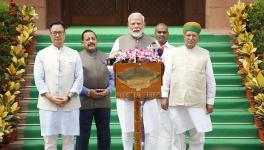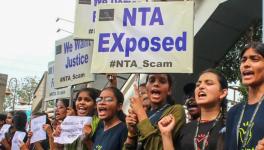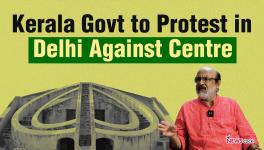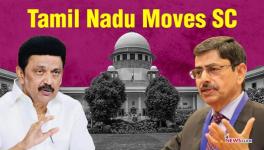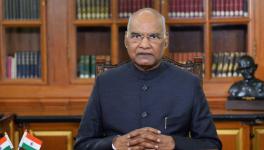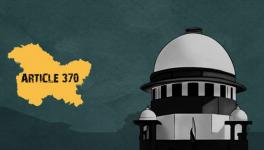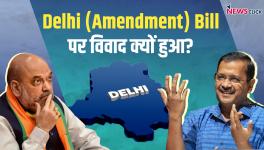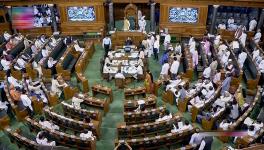Delhi Services Bill Part of Centre’s Project to Centralise Indian Polity
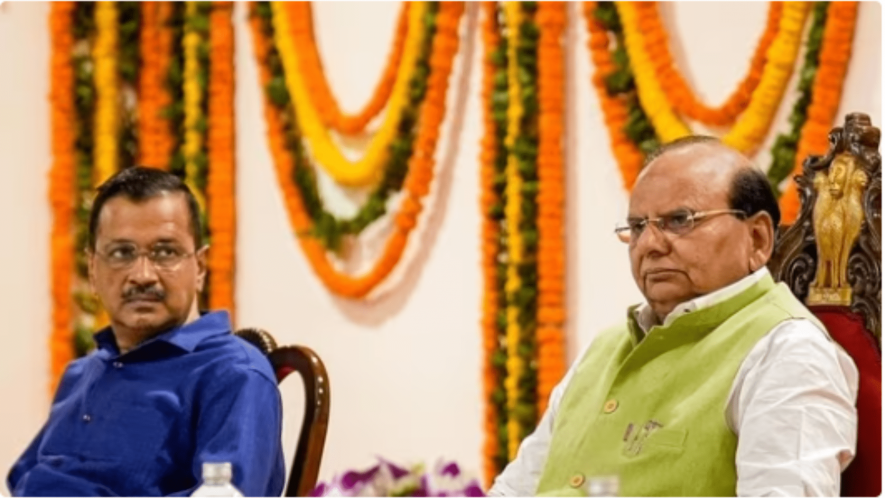
Delhi chief minister Arvind Kejriwal and lieutenant governor (LG) VK Saxena. Image Courtesy: PTI
On the night of 7 August, after an eight-hour debate, the Rajya Sabha passed the Delhi Services Bill, formally called the Government of National Capital Territory of Delhi (Amendment) Bill 2023, with 131 Members of Parliament voting in favour and 101 against.
This Bill, now passed by both houses of Parliament, establishes a National Capital Civil Services Authority, composed of the Chief Minister, the Chief Secretary of Delhi, and the Principal Home Secretary of Delhi. The role of this authority would be to make recommendations to the Lieutenant Governor (L-G) of Delhi on the transfers and postings of civil servants in Delhi and disciplinary issues.
The Bill grants broad powers to the L-G, including giving the L-G sole discretion in matters such as recommendations made by the National Capital Civil Services Authority. Moreover, the L-G has now been empowered to make determinations concerning the summoning, prorogation, and dissolution of the Delhi Legislative Assembly. It allows department secretaries to bring to the attention of the L-G, Chief Minister, and Chief Secretary any issues that might lead to disputes between the Delhi Government and the central government.
Federalism and Delhi Government
The entire process brings to the fore India’s uneasy relationship with federalism. The quasi-federal nature of our polity, sometimes also called federalism with a central bias, results in dramatic power struggles between the States and the Centre. Delhi is an essential party of these struggles, which makes its statehood important in two aspects. First, as an agenda for political parties, as seen in the Aam Aadmi Party’s Lok Sabha campaign in 2019. Secondly, as a point of contention reflected in constitutional amendments and judicial interpretations which tend to go back-and-forth on the issue.
In 1956, the States Reorganisation Act made Delhi a Union Territory directly administered by the President through the L-G. After that, in 1991, Delhi’s status as a State returned to the discussions.
The 69th Constitutional Amendment Act, 1991, inserted Article 239AA, which gave Delhi a special status as the National Capital Territory (NCT), and made it a Union Territory with a State Legislature. The Government of National Capital Territory of Delhi (GNCTD) Act, 1991, along with Article 239AA, formed the foundation of Delhi’s unique governance structure, balancing the roles of the elected government and the L-G. They defined the boundaries within which the Delhi government was to operate, clarifying decision-making processes, the L-G’s discretionary powers, and dispute-resolution mechanisms.
The Legislative Assembly of Delhi was granted the authority to legislate on various matters under the State List and Concurrent List of the Seventh Schedule of the Constitution. However, certain subjects, such as police, public order, and land, remained under the jurisdiction of the central government.
Judicial Overview
This skewed and teetering balance of power has fallen over many times in Delhi, especially concerning the functioning of civil servants and officials. The conflict between the AAP government and the central government reached a summit in 2015. It was centred around a Ministry of Home Affairs (MHA) notification that handed control over officer transfers, postings, and the Anti-Corruption Branch (ACB) from the Delhi government to the L-G.
The notification was grounded in the interpretation of Article 239AA, which grants specific powers to the L-G in areas like public order, police, and land. The AAP government contested this move, asserting it undermined their elected autonomy and decision-making authority.
In addition, the MHA notification clarified that the Delhi government lacked a separate State Public Services, and services were categorised under Union Territories Cadre overseen by the central government. The ACB’s jurisdiction was constrained, as it could not investigate offences involving central government officers.
In Rajender Prashad vs Govt of NCT of Delhi (2016), the High Court of Delhi held that “Delhi continues to be a Union Territory even after the Constitution (69th Amendment) Act, 1991 inserting Article 239AA making special provisions with respect to Delhi.”
In Govt of NCT of Delhi vs Union of India (2019), there was a split judgement on the issue of services, the majority being the then Chief Justice Dipak Misra, Justice AK Sikri, and Justice AM Khanwilkar. Justices DY Chandrachud and Ashok Bhushan delivered the minority judgement.
The majority judgement held that matters related to services, including the transfer and posting of officers from the central services, fall within the purview of the central government. The majority opinion acknowledged that the L-G should be apprised of decisions related to services to ensure effective governance, but concurrence was not required in routine matters.
The minority judgement adopted a slightly different view on this issue. It leaned towards giving the L-G a more active role in decisions related to services, asserting that the L-G’s concurrence should be sought for all matters concerning services. This interpretation implied that the L-G’s involvement should extend beyond being informed and that the L-G’s approval should be obtained for various service-related issues.
Nevertheless, the ultimate conclusion drawn in the judgement was that “services” in Delhi fall under the jurisdiction of the L-G and the central government, and are entirely out of the purview of the State government.
However, this judgement was completely overturned by the Supreme Court on 11 May, when a five-judge Constitution Bench led by Chief Justice DY Chandrachud held that the L-G of Delhi shall be bound by decisions of the Government of NCT of Delhi over the bureaucracy, except the three subjects, i.e., public order, police and land—on which the Centre exercises its authority through the L-G.
It was said that Article 239AA must be interpreted in a way that advances representative democracy because the provision was only intended to strike a balance between the interests of the Delhi government and the Centre.
The Bench disagreed with Justice Ashok Bhushan’s (now retired) assertion in the 2019 split verdict that “services” were not under the authority of the elected Delhi government.
The Centre, however, had other plans. On 19 May, the Government of National Capital Territory of Delhi (Amendment) or GNCTD Ordinance, 2023, was published by the President in an effort to assert the Centre’s control over the services in the NCT once again. The purpose of the Ordinance, according to its declaration, is to “provide for a comprehensive scheme of administration of services” that “balances the local and domestic interests of the people of Delhi with the democratic will of the entire nation reflected through the President of India”. In this sequence of developments, the GNCTD (Amendment) Bill, 2023, was introduced in Lok Sabha on 1 August to replace the Ordinance passed by Rajya Sabha.
Taking away the State government’s control over services in Delhi does not just take away its autonomy as an elected body, but also makes its policies toothless. This also serves as an effective tool for the “double engine” narrative, where the ruling party can push the idea that having the same party ruling at the Centre and State will result in lesser disputes and smoother governance in Delhi.
While Delhi remains significant for the central government, it is part of a much larger picture of federalism’s current status in India. While ruling party Members of Parliament have categorically said that India is not federal but quasi-federal, the political project to centralise India’s polity can be seen in the Centre's language policies as well as tackling the Lists in two ways: firstly, in legislating on subjects contained in the State List, such as passing the now repealed Farm Laws when agriculture is a State subject; and secondly, moving subjects from the State to the Concurrent List, a recent example of which is the plan to shift libraries to the latter.
The writer is currently studying law at Campus Law Centre, Faculty of Law, Delhi University. The views are personal.
Get the latest reports & analysis with people's perspective on Protests, movements & deep analytical videos, discussions of the current affairs in your Telegram app. Subscribe to NewsClick's Telegram channel & get Real-Time updates on stories, as they get published on our website.










